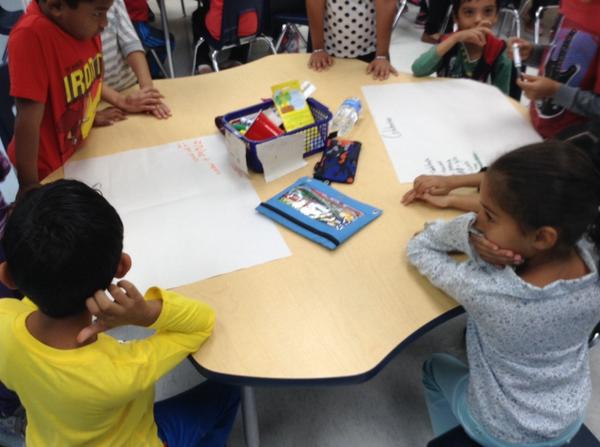The discussion came about when Brian made a post about a brand new app call Photomath. Basically its an app that can do algebraic equations for you. The question that Brian raises is what are we assessing when an app can do the math for us? Should we be assessing basic skills like this?
My response to this was there needs to be a shift to not what is the answer but how do you know the answer is correct. It reminded me of the calculator debate when I was in school. I still remember this movie we had to watch in grade eight and the two children were adding up some money. One of the girls takes out a calculator and clearly gets the wrong answer but strongly argues that she is right. When asked why, she states because the calculator told me. It turns out that the calculator was running low on batteries and if you used basic common sense then you would have known the answer was wrong. The point wasn't so much that she got it wrong but that there was faith in the answer because the technology told her so. The problem is that students then and now need to have a good conceptual understanding of the work before jumping into abstract thinking. They need to understand the process in learning.
The world has changed a lot since we were in school, heck even since I was in school (which to be fair was not that long ago). If you honestly look back and think about those school days, the information that we were given potentially would have lasted us our life time. To be fair the information our parents were taught did last them their lifetime. However, that is not so with the kids we are teaching. Technology has changed the way we use, process and understand the world around us. We live in a world were tomorrow has endless possibilities. The scary part is that I am preparing kids for a future with obsolete information and knowledge. Which is why philosophies on assessment have drastically changed.
A couple of years ago I was giving a test to my students. I looked up and saw that my students went right to talking with their math partners, trying to solve the questions. I was about to stop them and state that this is a test I need to know what you know when I realized that I already knew what they knew. Because of teaching in a constructivist approach, I knew where they were struggling, what strategies they would answer, and how they would communicate. In fact I knew why certain students were talking and asking questions and I knew what next steps would be useful for them. This test wouldn't tell me this, in fact it was wasting two hours of time that I could be conferencing with my students and helping them move forward.
 |
| Students collaboratively working on creating success criteria for an assignment |
Now I said I knew a lot, why? The reason is that in my teaching I am always conferencing with students, individually, and in groups. I have honest conversations with them and ask them questions to test their knowledge. Based on their responses and work samples I am able to see where fit on a continuum of learning. In fact I can confidently say that I understand my students more from this method then I do with a summative assessment like a test that I would have traditionally given. Not only that but my students move faster up that continuum because of our conferences and reflections that are done everyday versus just studying for one test to then forget about it the next day.
For me it is more important to teach my students to be curators or data, critical thinkers, problem solvers and have creative/adaptable thinking skills. I say this because the information I am teaching them will soon be obsolete. Now please don't get me wrong and say that students don't need to have basic skills or test taking abilities. Unfortunately in this school system and society they still need those test taking skills and yes students do need to learn basic skills (arithmetic, writing, reading, etc.) but the emphasis shouldn't be on memorizing to retain for an hour but to go deeper with that thinking and be able to understand why we are using it not just knowing and forgetting.
This brings me to my questions and ones that I hope everyone help can answer:
1) What assessment tools do you prefer and use in the classroom?
2) What skills are needed, as a teacher, to make assessment as and for learning effective for growing student achievement?
3) What do you think about the shift in assessment? Is it warranted? needed?
4) If we are moving to a more assessment as and for learning, how to we do this?
5) What is the biggest resistance to this change? How do we over come it?
I am really excited for this conversation as I think we are on the brink of exciting change in education. Would love to hear your comments and ideas about this topic, no matter what they are.

No comments:
Post a Comment